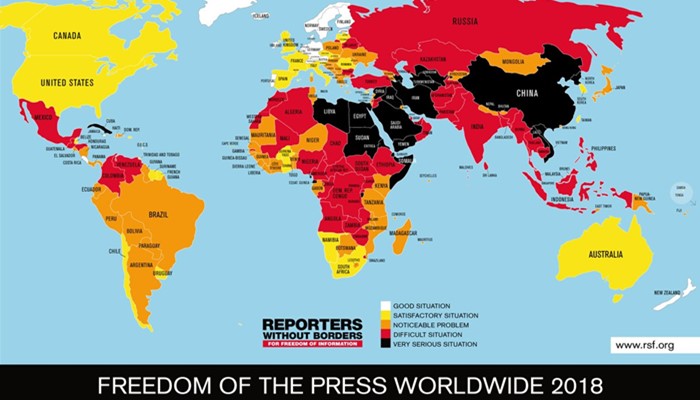Turkey, which has jailed more than 250 journalists and media workers, is ranked 157th among 180 countries in the 2018 World Press Freedom Index released on Wednesday by Reporters Without Borders (RSF).
As the world’s biggest prison for professional journalists, Turkey has managed to fall another two places in the past year, which saw a succession of mass trials, according to RSF. If Turkey drops two more spots, it will make it to the list of countries on the blacklist, which have the world’s poorest record in press freedom.
The 2018 World Press Freedom Index reflects growing animosity towards journalists, hostility towards the media openly encouraged by political leaders and the efforts of authoritarian regimes to export their vision of journalism, posing a threat to democracies.
“The climate of hatred is steadily more visible in the Index, which evaluates the level of press freedom in 180 countries each year. Hostility towards the media from political leaders is no longer limited to authoritarian countries such as Turkey (down two at 157th) and Egypt (161st), where ‘media-phobia’ is now so pronounced that journalists are routinely accused of terrorism and all those who don’t offer loyalty are arbitrarily imprisoned,” said RSF.
According to the index, the former Soviet countries and Turkey continue to be at the forefront of the worldwide decline in press freedom.
“Press freedom in Russia and Turkey has sunk to levels that are without precedent in more than three decades, a decline that is all the more worrying because of the influence that these two countries exert on the surrounding region,” said RSF.
“The world’s biggest prison for professional journalists, Turkey (157th) has managed to fall another two places in the past year, which saw a succession of mass trials. After more than a year in provisional detention, dozens of journalists have begun to be tried for alleged complicity in the July 2016 coup attempt. The first sentences to be handed down have included life imprisonment. The state of emergency in effect for nearly two years in Turkey has allowed the authorities to eradicate what was left of pluralism, opening the way for a constitutional reform consolidating President Erdogan’s grip on the country. The rule of law is now just a fading memory. That was confirmed by the failure to carry out a constitutional court ruling in January 2018 ordering the immediate release of two imprisoned journalists,” RSF said in its summary of the report.
Explaining in more detail in the section on Turkey, the report continues: “The witch hunt waged by President Recep Tayyip Erdogan’s government against its media critics has come to a head since an abortive coup in July 2016. A state of emergency has allowed the authorities to eliminate dozens of media outlets with the stroke of a pen, reducing pluralism to a handful of low-circulated and targeted publications. Turkey is again the world’s biggest prison for professional journalists, with members of the press spending more than a year in prison before trial and long jail sentences becoming the new norm—in some cases, journalists are sentenced to life imprisonment without the possibility of a pardon. Detained journalists and closed media outlets are denied any effective legal recourse. The rule of law is a fading memory under the now all-powerful president. Even constitutional court rulings are no longer automatically implemented. Censorship of websites and online social media has also reached unprecedented levels.”
“The unleashing of hatred towards journalists is one of the worst threats to democracies,” RSF Secretary-General Christophe Deloire said in a statement.
“Political leaders who fuel loathing for reporters bear heavy responsibility because they undermine the concept of public debate based on facts instead of propaganda. To dispute the legitimacy of journalism today is to play with extremely dangerous political fire.”
Turkey is the biggest jailer of journalists in the world. The most recent figures documented by SCF show that 259 journalists and media workers were in jail as of April 21, 2018, most in pretrial detention. Of those in prison 200 were under arrest pending trial while only 59 journalists have been convicted and are serving their time. Detention warrants are outstanding for 141 journalists who are living in exile or remain at large in Turkey.
Detaining tens of thousands of people over alleged links to the Gülen movement, the government also closed down about 200 media outlets after a coup attempt on July 15, 2016.
(Stockholm Center for Freedom [SCF] with Turkish Minute)

